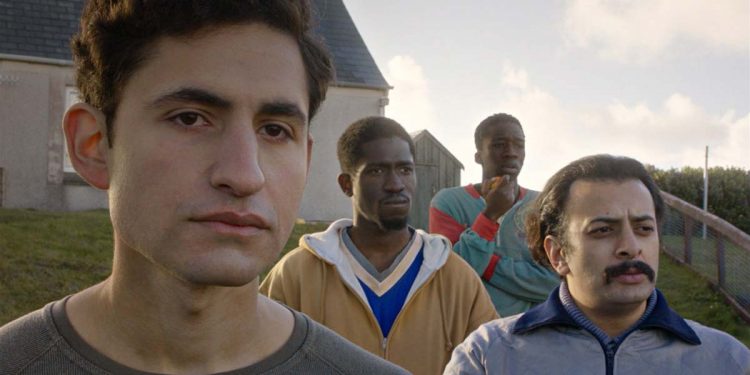Last year at TIFF, Nadav Lapid’s “Synonyms” presented the experience of an Israeli man acclimating to France as a frenetic, sensual bacchanal of chaos. Lapid’s absurdist account of the (im)possibilities of naturalisation would make for a stunning double feature with Ben Sharrock’s “Limbo,” which presents the refugee experience of a group of men in a remote corner of Scotland’s Outer Hebrides, a stultifying, absurdist dreamscape that is beginning to congeal into something uncomfortable. The title, “Limbo,” is fitting for a film that sharply eschews moments of cinematic realism in key sequences even as the emotions it excavates are real as can be. Sharrock directs his own script, which articulates the difficulty of forging one’s identity in a strange land.
Strangeness is central to the opening sequences as a group of male refugees observe two locals, Helga and Boris, attempting to give the refugees classes in “cultural awareness”. Helga and Boris’ enthusiasm are only matched by their misguidedness. They seem too ridiculous to be sincere. But ridiculous is only natural when your surroundings project a sense of unreality. Nick Cooke’s cinematography shoots the landscape of the island like something picaresque and remote. His almost formalist approach to framing the sequences heightens Sharrock’s already absurdist viewpoint, establishing and the emphasising the relentless strangeness of the situation. Before these men can claim official refugee status, they remain in limbo on this island. They may get status – in a few months, or years. Until that time, life is a series of moments. Real and yet unreal.
Omar is a Syrian refugee on the island who seems markedly aware of the strangeness of this liminal space. For much of the film’s first act, Amir El-Masry’s eyes look out at the camera as if questioning his surroundings. In an early scene, four white teenagers stop him on the road, curious about his origins. Is he a terrorist? Does he rape women? Is he going to blow Scotland up? Sharrock is an expert at modulating tone, so the sheer racism of their interactions is not compromised even as he directs the moment as a comedy-sequence gone wrong. El-Masry deadpan confirms the obvious: No, he is not there to blow up Scotland. In a later moment, a fisherman struggles to explain what the slur “Paki” means before his daughter helpfully explains, “Like Pakistani!”.

It’s a balancing act matching the outrageousness of the local bigotry with the implications of isolation for the refugees. And, it’s the biggest commendation of Sharrock’s work here that he makes it look easy. The hints of something messier seem peripheral at first. The first act presents itself as a refugee version of a hang-out movie as Omar and his fellow refugees – Wasef and Abedi (from Africa), and Farhad (from Central Asia) – men make jokes with each other. They watch “Friends,” debate the merits of Ross and Rachel being ‘on a break,’ consider their own futures and suffer through classes in “cultural awareness”. Little by little, cracks begin to show. Even in limbo, the real world must seep in – so as we come to know these men, the cracks in their lives begin to take centre stage. And it is here Sharrock navigates the move from comedy to something more sombre with aplomb.
Omar is the central figure and the film devotes its biggest arc to examining his past, which is symbolised by the oud he carries around him. Omar seems shackled to the stringed instrument. He was a musician back in Syria, but seems unable to actually play anymore. His only connection to home is the intermittent phone-calls he makes to his mother from the phonebooth, as other refugees await their turn. His parents have sought refuge in Turkey, awaiting Omar’s success in the UK. Meanwhile, his older brother has remained to fight in Syria. Sharrock taps into the guilt and ambivalence of the refugee situation. Omar denies himself any happiness or clarity, instead preferring the unresolvedness that being in limbo presents him with. But you can only outrun your emotions for so long. Reality catches up with the roommates in a mid-film revelation that interrupts the humour, and from there the situation devolves.
Sharrock has a great eye, and ear, for observational humour and “Limbo” builds itself my establishing the entire cast – major and minor – as distinct features of this community. It feels like a small miracle that “Limbo” never feels condescending or too prosaic. Instead, it’s the empathy that sustains it, even when it leans into situations that seem too absurd for words. But there’s a clear-eyed value in that mode. El-Masry is excellent tracing Omar’s effortful attempts to remain stoic amidst the days. As his inability to emotionally disconnect gives way to panic, grief and then something like catharsis, he carries the film’s emotional acuity on his shoulders. In a late scene, he picks up a packet of spices and inhales in a supermarket. It was one of the most cathartic moments I’ve witnessed at TIFF so far.
Sharrock recognises the inherent ridiculousness of the situation, as these men are forced to depersonalise their existence if they want to survive. We don’t need explicit reminders of the worlds these men have left. We know enough about those worlds from their willingness to remain in the uncertainty of their limbo lives. Late in the film, Omar angrily asks the almost beatifically relaxed Farhad how he is able to maintain his joyful disposition. It’s only Farhad’s stark response that makes Omar realise the need for illusion in this limbo world. To be a refugee is to constantly build up your identity in various forms, and it’s a building up that never really stops. So, “Limbo” does not arrive at a conclusion that offers solutions. Instead, Sharrock concludes with a quietude that feels natural reaffirming his humane recognition of these men as people doing their best to survive in an unpredictable world.







